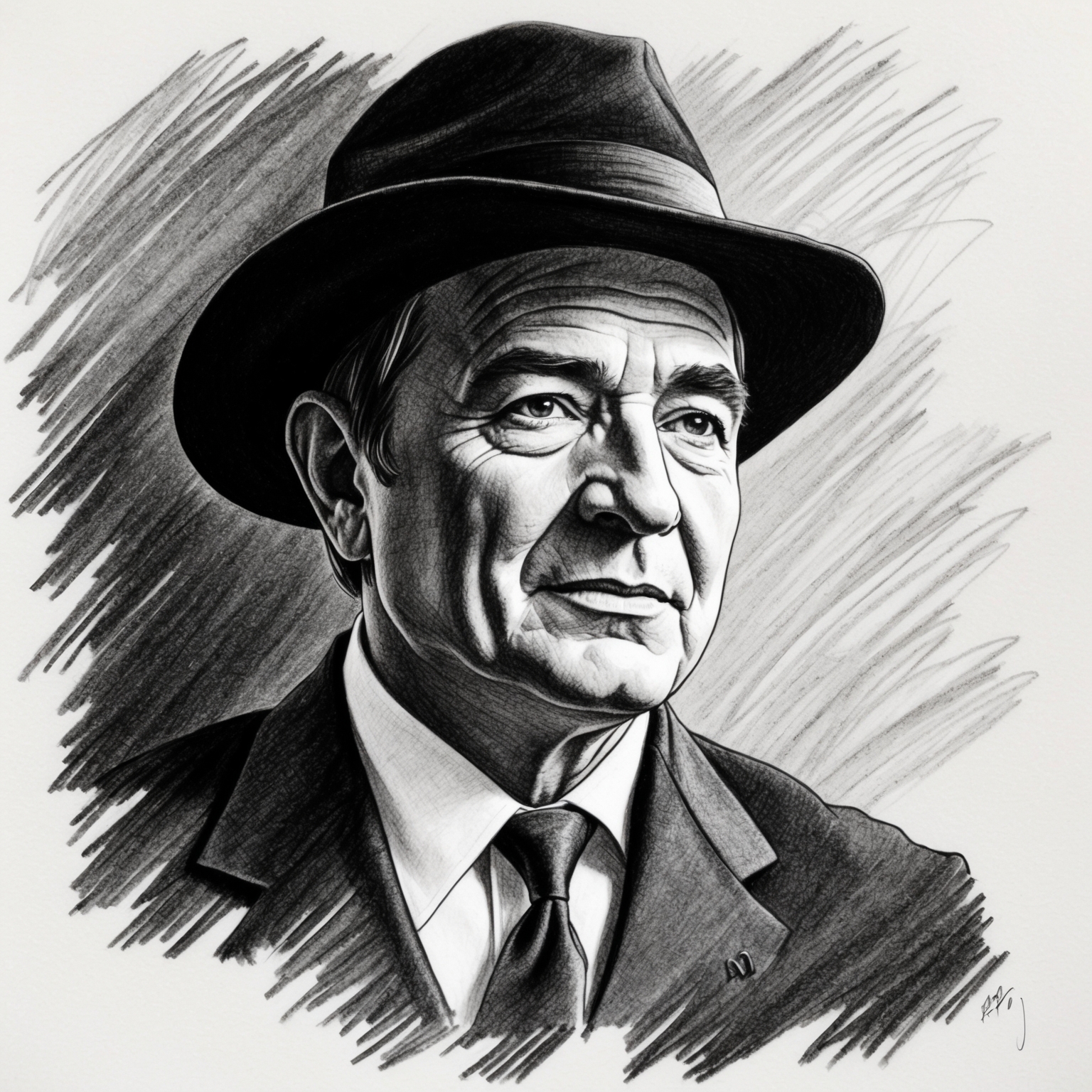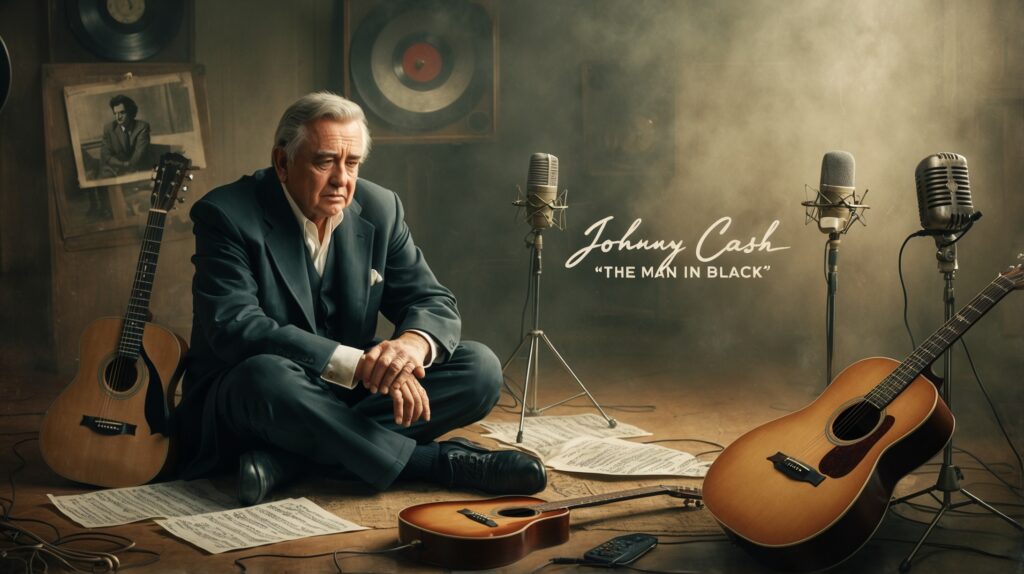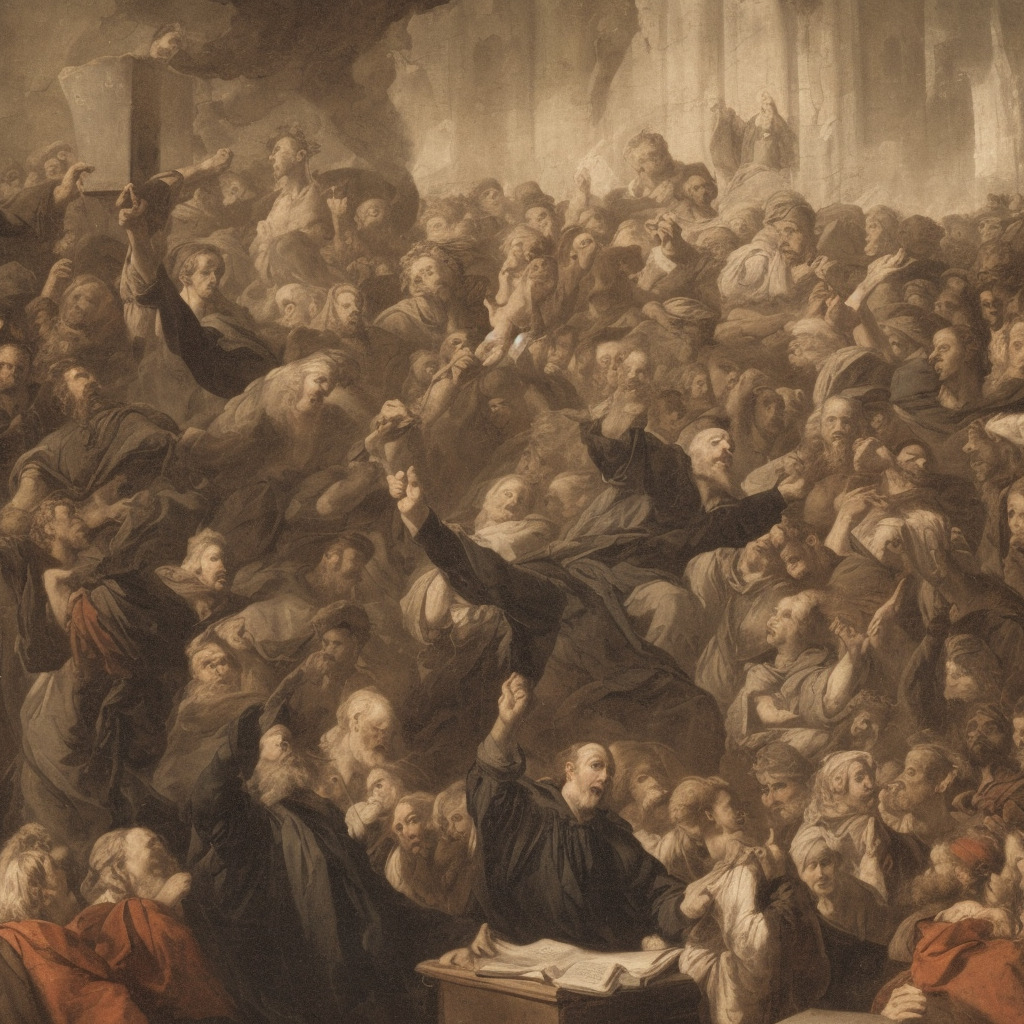Johnny Cash: The Man in Black’s Enduring Legacy
Dive into the extraordinary journey of Johnny Cash, whose rendition of ‘Hurt’ encapsulates the essence of his lifetime contributions to music. From humble beginnings to an enduring legend, discover how Cash left an indelible mark on the hearts of many.

Johnny Cash, often celebrated as ‘The Man in Black,’ is an iconic figure in the world of music, whose influence has spanned multiple generations and genres. Known for his deep, resonant voice and profound lyrics, Cash’s rendition of ‘Hurt’ marked a poignant moment in his illustrious career, serving as both a reflection on his life’s journey and a testament to his enduring impact on music. The song, originally written and performed by Trent Reznor of Nine Inch Nails, took on a new life in Cash’s hands, highlighting his unique ability to convey raw emotion and vulnerability.
Born in 1932 in Kingsland, Arkansas, Cash grew up immersed in the sounds of gospel and country music. His early life was marked by struggle and hardship, which deeply influenced his artistic expression. Cash began his music career in the mid-1950s, rising to fame with his distinctive blend of country, rock, and gospel genres. With hits like ‘Ring of Fire,’ ‘I Walk the Line,’ and ‘Folsom Prison Blues,’ Cash solidified his place in music history, earning numerous awards including multiple Grammys and an induction into the Country Music Hall of Fame.
By the time ‘Hurt’ was released in 2002, Cash was already a towering legend in the music industry. The era surrounding the song’s release was marked by reflection and retrospection, as Cash grappled with health issues and the loss of loved ones. His collaboration with producer Rick Rubin on the ‘American Recordings’ series breathed new life into his career, attracting a new generation of fans. The stark and haunting interpretation of ‘Hurt’ was initially met with widespread acclaim, with critics and fans alike praising Cash’s ability to infuse the song with his own life experiences, making it a powerful swan song in his remarkable career.
The Creative Genius Behind ‘Hurt’
Delve into the creative mind of Trent Reznor, the composer behind ‘Hurt’. Discover his musical journey, style, and the profound impact his work has on the song’s legacy and success.

Background and Career: The song ‘Hurt’, famously covered by Johnny Cash, was originally composed by Trent Reznor, the leading force behind the industrial rock project Nine Inch Nails. Born on May 17, 1965, in Mercer, Pennsylvania, Reznor grew up with a strong interest in music and trained as a classical pianist during his youth. After studying computer engineering and music at Allegheny College, he ventured into the music scene with a variety of small bands, paving his way into prominence by forming Nine Inch Nails in 1988. Reznor quickly became known for his innovative approach to music, blending elements of industrial, rock, and electronic music.
Musical Style and Influences: Reznor’s style is a unique fusion of aggressive industrial sounds with introspective lyrical content. Influenced by iconic bands like Ministry and Skinny Puppy, he also drew inspiration from the electronic landscape crafted by artists such as Depeche Mode and Kraftwerk. His ability to create emotional depth in his music distinguishes him from his peers and is evident in Nine Inch Nails’ debut album ‘Pretty Hate Machine’, where ‘Hurt’ originally appeared.
Role in the Song’s Creation: Trent Reznor both composed and produced ‘Hurt’, highlighting his talent in intertwining haunting melodies with profound lyrics. The song serves as the closing track on Nine Inch Nails’ 1994 concept album ‘The Downward Spiral’, a project that delves into themes of self-destruction and existential angst. Reznor’s unique compositional choices, such as the minimalist structure and haunting vocal delivery, contributed to the raw and emotional impact of the track. The way the music complements the lyrical exploration of pain reflects Reznor’s genius in using sound to enhance storytelling.
Impact on the Song’s Success: Although ‘Hurt’ was already a lauded track within Reznor’s repertoire, it gained new life through Johnny Cash’s rendition, which Reznor himself praised as a deeply moving interpretation. Reznor’s composition was pivotal in ensuring the song’s longevity and resonance across different audiences, allowing it to transcend its original genre.
Legacy and Influence: Trent Reznor’s work on ‘Hurt’ is part of his broader legacy as a trailblazer in the industrial rock genre. His innovative techniques have not only influenced countless artists but have also pushed the boundaries of music production, earning him critical acclaim and awards, including multiple Grammys. By exploring deep emotional themes through stark musical frameworks, Reznor has left an indelible mark on the music industry.
A Celebrated Legacy: Awards, Accolades, and Inspirational Covers
Explore the accolades and vast cultural influence of Johnny Cash’s rendition of “Hurt,” including awards, notable covers, and appearances in films, TV, and games.

Johnny Cash’s rendition of “Hurt” is more than just a cover; it’s a profound artistic statement that has garnered numerous awards and widespread acclaim. Initially a song by Nine Inch Nails, Cash’s version was released in 2002 as part of his album “American IV: The Man Comes Around.” The song immediately resonated with audiences and critics alike, earning Cash multiple accolades during his lifetime and beyond. Among its most prestigious recognitions, “Hurt” received nominations for awards such as the Grammy Award for Best Male Country Vocal Performance, solidifying Cash’s enduring impact on music.
Aside from awards, “Hurt” has been covered by a slew of artists across various genres, highlighting its universal appeal and timeless message. Musician Leona Lewis offered her own poignant interpretation, while industrial band Nine Inch Nails has expressed deep admiration for Cash’s version, having never anticipated its substantial emotional resonance. These covers keep the song alive and relevant, paying homage to Cash’s transformative interpretation.
Beyond the world of music, “Hurt” has made its mark in pop culture through appearances in films, television series, and even video games. Its haunting strains have been featured in movies like “Logan,” enhancing climactic moments with its somber tone. Television shows such as “Criminal Minds” have also utilized the song to add depth to key scenes, proving that Cash’s “Hurt” continues to reverberate through various facets of media, enriching narrative with its poignant emotions.
Chart Success and Cultural Resonance of Johnny Cash’s ‘Hurt’
Johnny Cash’s cover of ‘Hurt’ may not have topped charts worldwide immediately, but its emotional depth and critical acclaim cemented its status as a cultural milestone, transcending traditional commercial success.

Johnny Cash’s cover of ‘Hurt’ by Nine Inch Nails wasn’t just a notable entry into the annals of music history; it was a seismic event that echoed across both pop culture and critical discourse. Released in 2002, as part of his album American IV: The Man Comes Around, Cash’s rendition initially made modest waves on the charts. It didn’t skyrocket to the top immediately, peaking at number 33 on the Billboard Alternative Songs chart, but its impact transcended mere numbers. By contrast, the original track by Nine Inch Nails had a more traditional chart trajectory, yet it was Cash’s poignant and somber interpretation that struck a deeper chord with audiences.
This song, arriving late in Cash’s illustrious career, marked a poignant moment of resurgence, bridging a connection between the legendary country artist and a new generation. While it was not a runaway commercial hit in the traditional sense, the authenticity and raw emotion in ‘Hurt’ garnered critical acclaim, solidifying Cash’s place as an artist capable of continually reinventing himself. Industry critiques praised the song for its haunting emotional depth, with Cash’s frail voice adding layers of meaning to Trent Reznor’s already powerful lyrics.
The music video further contributed to the song’s legacy, with its stark and haunting visuals enhancing public and critical appreciation. Unlike typical marketing campaigns, the success of ‘Hurt’ was driven by word-of-mouth and organic storytelling, resonating deeply with listeners and achieving a kind of viral fame that preceded the social media boom. Platforms like YouTube later elevated the song’s digital footprint, turning the music video into a touchstone for fans both old and new, and marking the track, years on, as a perennial fixture in Cash’s live and posthumous catalogues.
A Visual Testament of Reflection and Legacy
The music video for Johnny Cash’s “Hurt,” directed by Mark Romanek, is a profound visual exploration of themes like regret and legacy. Its critical acclaim and emotional depth significantly contributed to the song’s lasting impact.

The music video for Johnny Cash’s poignant rendition of “Hurt” stands as a profound statement in the pantheon of music visuals. Released in 2003 and directed by Mark Romanek, the video is a compelling exploration of themes such as regret, reflection, and mortality. Shot primarily in Cash’s home and the defunct House of Cash museum, the video’s somber imagery provides a stark contrast to the lush landscapes and vibrant life scenes typical of music videos at the time. Instead, the visuals powerfully reflect the emotional weight of the song’s lyrics, painting a haunting picture of a life examined.
The direction by Mark Romanek cannot be understated as a vital force in the video’s success and its contribution to the song’s enduring popularity. Romanek, praised for his creative prowess, was instrumental in crafting a piece that not only enhanced the song’s message but brought a deeper layer of introspection and sentimentality. His decision to intersperse archival footage of Cash’s younger days with shots of the frail artist added layers of contrast and depth, emphasizing the passage of time and the inevitability of life’s end.
Critically acclaimed, the music video was hailed as a masterpiece and won the Grammy Award for Best Short Form Music Video in 2004. Additionally, it received six nominations at the MTV Video Music Awards, further solidifying its place in music video history. Featuring no celebrity cameos, the spotlight remained firmly on Cash, allowing viewers to connect intimately with his legacy. This unadorned focus resonated strongly with audiences and critics alike, leaving a lasting impression that continues to elicit emotional responses across generations.
A Deep Dive into the Musical Anatomy of Johnny Cash’s ‘Hurt’
Explore the intricate musical structure of Johnny Cash’s ‘Hurt,’ from its key and chord progression to its tempo and instrumentation, and understand how these elements align with Cash’s artistic journey.

Johnny Cash’s rendition of ‘Hurt’ stands as a poignant reflection of the artist’s legacy, combining raw lyrics with a compelling musical structure that dissects human vulnerability. The song is written in the key of A minor, which complements its somber and introspective nature. This choice of key evokes a sense of melancholy and reflection, aligning perfectly with the emotional weight carried by the song. The chord progression mainly revolves around the chords A minor, C, D, and G, which add to the haunting ambiance by maintaining simplicity while highlighting Cash’s vocal performance.The tempo of ‘Hurt’ is relatively slow, with approximately 90 beats per minute. This deliberate pace allows the listener to absorb the lyrical content deeply and to feel each note’s emotional pull. The rhythm is steady, reflecting a heartbeat-like quality that intensifies the song’s introspective nature. The song’s melody remains uncomplicated yet powerful, employing minimalistic harmonies to spotlight Cash’s deep, gravelly vocals.Instrumentation in ‘Hurt’ is robust yet subdued. The primary instrument is the acoustic guitar, with its gentle strumming setting the foundational mood. Piano accents punctuate the arrangement, adding an additional layer of emotional depth. The sparse use of strings further enhances the somber atmosphere, creating a haunting resonance that lingers with the listener. This arrangement echoes the introspective and raw themes present in Cash’s later works, while diverging from the more upbeat and rhythmic tracks found earlier in his discography.The production of ‘Hurt’ was handled by producer Rick Rubin at The Cash Cabin Studio. Rubin’s minimalist yet deeply personal approach to recording this track allowed Cash’s voice to take center stage. An interesting anecdote from the recording session is that Rubin reportedly encouraged Cash to deliver the song as if he were offering his final message to the world, a sentiment that is palpable in every line. This production decision ensured that ‘Hurt’ became not just a song, but a poignant closing chapter in Cash’s storied career.
Exploring the Depths of Emotion in ‘Hurt’ by Johnny Cash
Johnny Cash’s rendition of ‘Hurt’ delves deeply into themes of self-reflection, existential pain, and the human experience. The song’s introspective narrative style, coupled with raw emotional delivery and profound literary devices, creates a poignant landscape that resonates deeply with audiences.
To see if I still feel
I focus on the pain
The only thing that’s real
The needle tears a hole
The old familiar sting
Try to kill it all away
But I remember everything
What have I become
My sweetest friend
Everyone I know goes away
In the end
…
******* This Lyrics is NOT for Commercial use *******
 Lyrical Themes and Messages: At the heart of Johnny Cash’s rendition of “Hurt,” the lyrics delve into profound themes of self-reflection, regret, and existential pain. The song is a poignant exploration of the human experience, capturing a man’s introspective journey as he grapples with his past and the inevitability of loss and mortality. Cash delivers these themes with an intimacy that resonates deeply with listeners, evoking a shared sense of vulnerability and honesty. While originally penned by Trent Reznor of Nine Inch Nails, Johnny Cash’s interpretation imbues the song with a personal, haunting melancholy that many interpret as reflective of his own life and struggles.
Lyrical Themes and Messages: At the heart of Johnny Cash’s rendition of “Hurt,” the lyrics delve into profound themes of self-reflection, regret, and existential pain. The song is a poignant exploration of the human experience, capturing a man’s introspective journey as he grapples with his past and the inevitability of loss and mortality. Cash delivers these themes with an intimacy that resonates deeply with listeners, evoking a shared sense of vulnerability and honesty. While originally penned by Trent Reznor of Nine Inch Nails, Johnny Cash’s interpretation imbues the song with a personal, haunting melancholy that many interpret as reflective of his own life and struggles.
Narrative and Storytelling: The narrative of “Hurt” unfolds in the first person, drawing listeners into a conversation with the self. This perspective allows for a direct connection to the emotions expressed, making the storytelling intensely personal and relatable. The lyrics paint a vivid picture of a life marred by pain and an unrelenting quest for meaning amidst suffering. This self-dialogue is not just an indictment of past actions but also a lament for the fleeting nature of life and relationships, highlighted through lines like “Everyone I know goes away in the end,” underscoring a narrative of loss and the search for redemption.
Use of Literary Devices: Cash’s rendition of “Hurt” is rich with literary devices that amplify its emotional impact. The initial lines, “I hurt myself today/To see if I still feel,” utilize a juxtaposition of self-inflicted pain as a means of examining one’s existence. Metaphors and symbolic language are woven throughout, with the “needle” serving both a literal and metaphorical purpose. The stark simplicity of Reznor’s original lyrics is preserved, yet Cash’s delivery elevates them to a poetic level, caressing each word with a gravitas that only adds to its introspective weight.
Emotional Impact and Relatability: The emotional impact of “Hurt” cannot be overstated. Cash’s voice, weathered and raw, infuses the song with an authenticity that reaches into the depths of the listener’s soul. The lyrics’ exploration of universal themes such as suffering, loss, and regret makes them overwhelmingly relatable, invoking feelings of empathy and reflection. It’s this authenticity that has cemented the song as a lasting piece of musical art, deeply cherished by fans across generations.
Cultural and Social References: “Hurt” bridges cultural and temporal divides, speaking to the universal human condition. While there isn’t an overt use of historical references, the song’s introspective nature compels listeners to confront broader existential questions that have resonated throughout history. Cash’s storied life, embodying the struggles of addiction and redemption, colors the lyrics with a uniquely personal yet universally accessible tone, making it relevant across varied audiences.
Did you know? Johnny Cash’s iconic Hurt was originally a Nine Inch Nails track! Cash turned it into a timeless tearjerker. 🎶 #ManInBlack #MusicMagic #FunFact tinyurl.com/2vrd9ju8
Click to Tweet







